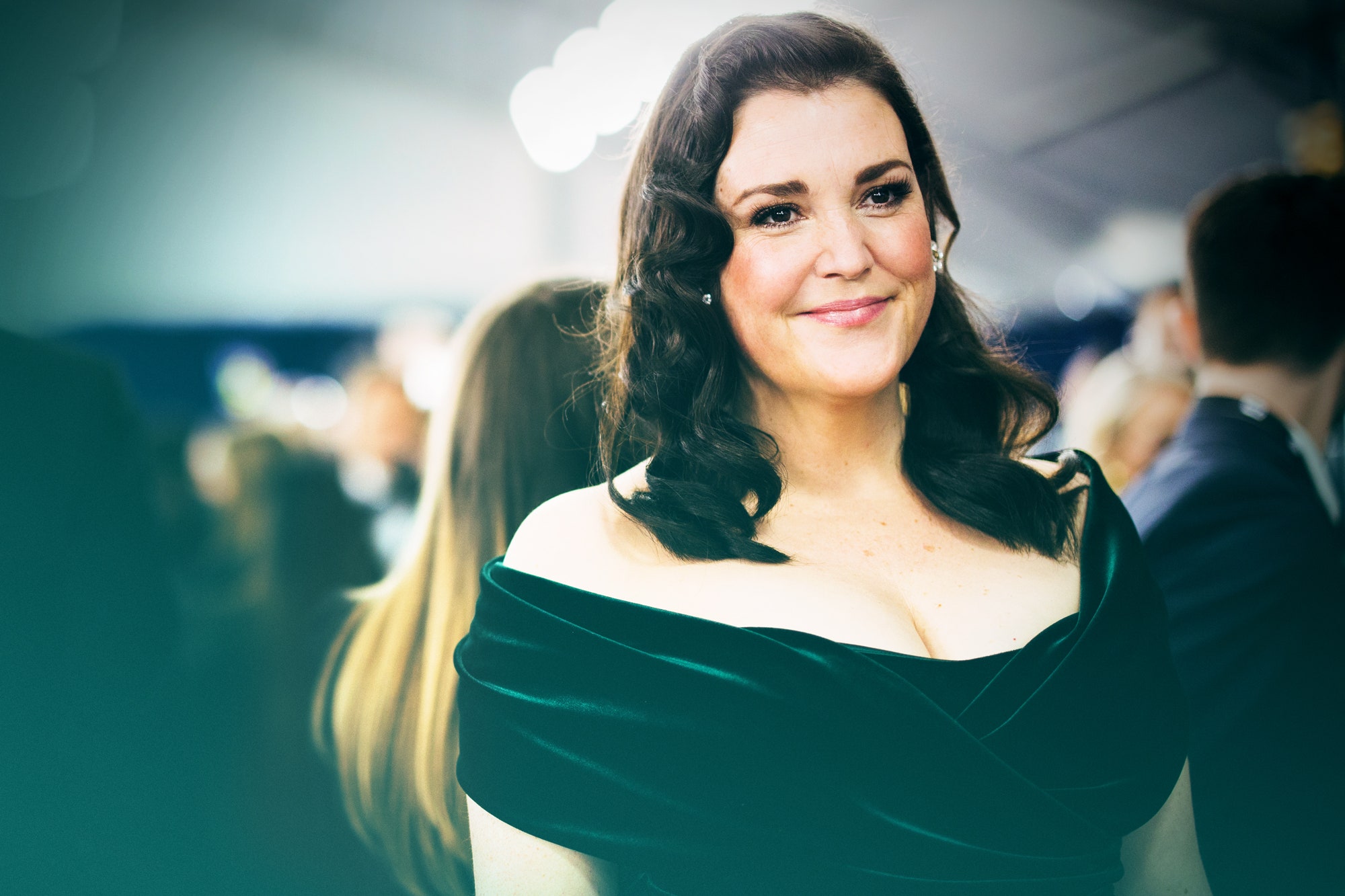Melanie Lynskey has been a working actor for almost three decades, and until a few months ago, she’d never been invited on a talk show. She was too indie, too niche, not widely known. She came close years ago on an audition for Craig Ferguson’s Late Late Show but “failed” the opportunity; the talent booker told her she “asked too many questions” and didn’t talk enough about herself. (“I was trying to have a conversation, I guess, which is not the way to do it.”) Flash forward to this past winter, with Lynskey coming off the most popular project of her career—Showtime’s new drama Yellowjackets. Finally, late-night offers started pouring in. In a cruel twist of irony, though, the actor was too busy to say yes. “I wasn’t allowed to go and do any of those things,” Lynskey says in our Little Gold Men interview (listen below). “I’m always grateful to be working above anything else but at the same time I was like, Ah!”
To be more specific, Lynskey was preoccupied with her next project—the Hulu true-crime thriller Candy, costarring Jessica Biel. Here, Lynskey takes on another rich, complicated lead role; premiering May 9, the limited series appears bound to court as much critical and viewer attention as the show that just launched her profile into the Hollywood stratosphere. For an actor whose IMDb résumé features an array of superb if little-seen performances, the shift in visibility—and, inevitably in turn, opportunity—has felt stark. “It’s been very weird for me, I’ve never had any of this,” she says. But along the way, she’s hitting some life highlights. Of one recent milestone, she says, “How lucky am I to have had that moment in my life?”
Collaborators I’ve spoken with over the past few months wouldn’t point to luck; they’d say Lynskey is overdue. “She might be the nicest human being on this planet, literally speaking,” says Biel. “And she’s a great collaborator and a wonderful scene partner.” Speaking about their work together on Don’t Look Up, Leonardo DiCaprio recently told me, “She’s just a fantastic, fantastic actress, and everything that comes out of her mouth is so truthful.” That film’s casting director, Francine Maisler, added, “Melanie’s one of our best. I know that there are so many stars in [Don’t Look Up], but to me, Melanie’s a star. Her talent is equal to anyone in this. She’s as good as them, and she just hasn’t been given [the opportunity].”
Lynskey has consistently avoided the easy route through Hollywood. She grew up in New Zealand reading movie magazines, admiring critics and the challenging work they championed. One highlight of the excitement around 1994’s Heavenly Creatures, her electric screen-acting debut she completed as a teenager, was Miramax offering to send her reviews of the movie. “I’ve never felt fancier in my life getting faxes of those reviews sent to my dad’s office,” she says with a laugh.
Valuing that art-house corner of filmmaking has guided Lynskey through major shifts in Hollywood, difficult personal periods, and a range of low-budget work she remains deeply proud of. It helps explain, for instance, why she left the popular sitcom Two and a Half Men—her then-steadiest acting job to date, which was on the cusp of delivering her a huge paycheck—after two years as a series regular. (She guest-starred in later seasons.) “The people who were my agents at the time thought I was absolutely crazy,” she recalls. “But there were things I really liked about the show, and things that were not for me 100 percent. And I was the wacky neighbor. … It’s very hard to get out of a decade of playing the wacky neighbor.”
In the years thereafter, Lynskey toplined unsung gems like Hello I Must Be Going and I Don’t Feel at Home in This World Anymore. “It is heartbreaking when you work so hard, and you love something, and it just kind of gets lost in the shuffle,” she says. “There have been a few of those that I wish more people had seen.” It’s also an experience she’d gotten somewhat used to. Enter Yellowjackets—and the hype frenzy that followed, that few saw coming.
“I’m used to doing things, and having a few people say, ‘Oh, I love that thing that you did,’ and then slowly over the years, two or three more people a year being like, ‘Oh, I managed to catch that, it was on Amazon!’” Lynskey explains. “People I hadn’t heard from in years were getting in touch with me [about Yellowjackets]. I started to do some interviews, and then what I was saying in the interviews, people were paying attention to. It was a really hard, odd place to be for me. I was like, ‘Oh, gosh, I’ve got to start watching myself, because I have no filter.’”
Particularly being a “regular-sized” woman in the industry, Lynskey has encountered sexism within and without it as long as she’s been a working actor. She recalls the conversation around Hello I Must Be Going, a rare instance in which she regretted reading some of the critiques. “I was having an affair in the movie with a younger man, and I think a male reviewer is going to put himself in the young man’s position. A couple of reviewers just said, ‘Oh, really, would he really be attracted to her?’” Her character on Yellowjackets, too, has an affair with a younger man, one of many story lines the show’s rabid fanbase latched on to: “There’s this narrative in Hollywood that people don’t want to see female-driven projects…and it’s just proved to be wrong over and over again. People do want to see middle-aged women. There is an audience.”
Those of us who’ve seen Lynskey steal everything from the Tom McCarthy movie Win Win to the Duplass brothers’ HBO series Togetherness can’t exactly claim surprise at how good Lynskey is in Yellowjackets. (She stars opposite Christina Ricci, Juliette Lewis, and Tawny Cypress.) But the drama marked a grand introduction to her work for many viewers. Fortunately, the role of Shauna—a plane crash survivor as a teen who grapples with resurfacing trauma as an adult—showcases the many layers of her talent. She gets to be flirty and sweet, then cold and calculating; every episode seems to reveal her in a completely new light. When we—spoiler alert!—see exactly how murder might affect her, Lynskey unveils something freshly mesmerizing.
In all that, there’s a lot to keep track of. Lynskey would ask her writers to keep her apprised of the series’s ever-evolving mythology and the character twists that arrived by the hour. She wanted her performance to feel holistic, modulated by as much detail as possible. “They’d say, ‘Something big is happening, and we can’t wait for you to see it,’ and I would be like, ‘No, that’s not a real answer. I do need to know,” she says. “I’m like, ‘This thing doesn’t add up, this plot point doesn’t make sense when you’ve considered this thing.’ One of the writers of Yellowjackets was like, ‘Boy, you like to keep us on our toes.’ And I was like, ‘Well, yeah, because then you’re paying attention!’ If I’m asking the question, people watching are going to be asking the question. As it turns out, I was right.”
That kind of self-advocacy has defined much of her long, varied career. Lynskey identifies closely with her characters. Of Candy’s Betty Gore, the Texas homemaker brutally murdered by her neighbor Candy Montgomery (Biel), Lynskey tells me, “I felt very connected to Betty—I was a very shy, awkward child who had a really hard time making friends. I never knew what the right thing to say was, and I saw that in her. … Part of her story was that she didn’t fit into the kind of popular-girl mold that I’ve never fit into as an actress.” Lynskey felt a responsibility in bringing to life the spirit of a real woman whose death garnered more attention than her life: “I wanted to be respectful of her memory, but I also didn’t want to completely sugarcoat it. I didn’t want to make her just sort of the sweet victim.” The series unfolds initially as an examination of the fateful day of her death, before the clock winds backward and we follow Candy’s and Betty’s ‘80s suburban lives in parallel. Again, Lynskey finds room for nuance, depth, surprise.
After such a breakout year, awards attention is set to follow. In fact, it’s already started—Lynskey won the Critics Choice Award for best actress in a drama series last month, a major first stop on the circuit. Standing onstage for her acceptance speech, she says she was “a wreck,” taking in “a once-in-a-lifetime” moment. The recognition coming from critics—those writers and thinkers she’s admired since before entering the business in her teens—felt especially powerful. “It could not be more meaningful from this group of people who I have such respect for,” Lynskey says. “I really did not expect it.” Well, there’s one more thing that may soon change.
— Will Smith Banned From the Oscars for 10 Years After the Slap
— Amanda Seyfried Wants to Reprise Her Role as Elizabeth Holmes
— Way-Too-Early Predictions for the 2023 Oscars
— Anatomy of a Scandal Explores Power, Consent, and Sienna Miller’s Own Past
— Adam Scott on That Severance Cliff-Hanger
— Can the Grammys and the Oscars Save Themselves?
— Sign up for the “Awards Insider” newsletter for must-read industry and awards coverage.


